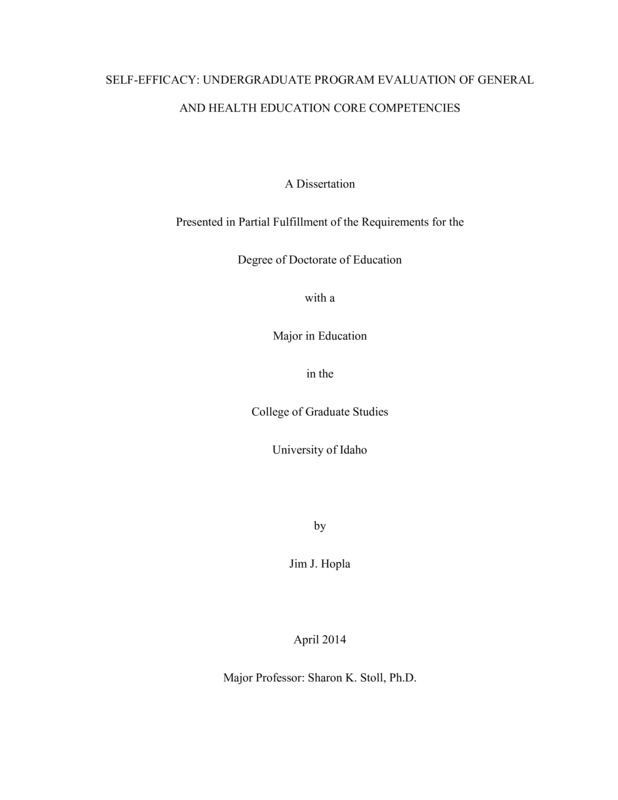SELF-EFFICACY: UNDERGRADUATE PROGRAM EVALUATION OF GENERAL AND HEALTH EDUCATION CORE COMPETENCIES
Hopla, Jim J.. (2014). SELF-EFFICACY: UNDERGRADUATE PROGRAM EVALUATION OF GENERAL AND HEALTH EDUCATION CORE COMPETENCIES. Theses and Dissertations Collection, University of Idaho Library Digital Collections. https://www.lib.uidaho.edu/digital/etd/items/hopla_idaho_0089e_10331.html
- Title:
- SELF-EFFICACY: UNDERGRADUATE PROGRAM EVALUATION OF GENERAL AND HEALTH EDUCATION CORE COMPETENCIES
- Author:
- Hopla, Jim J.
- Date:
- 2014
- Keywords:
- competencies experiential learning health education health sciences self-efficacy
- Program:
- Interdisciplinary Studies
- Subject Category:
- Health education; Education; Health sciences
- Abstract:
-
One of the general purposes of all university communities is effective teaching and learning. Learning disciplinary knowledge involves application and confidence to do. Undergraduate students with high levels of self-efficacy are more confident to perform program expectations and competencies. There are two descriptive studies found in this paper.
The first study examined the relationship between general self-efficacy and Health Science major program's goals relating to the profession's core competencies. The results found a significant moderate positive relationship between general self-efficacy and the seven core health education competencies within an individual Health Science program (r = .364, .383, and .376). The study used two instruments; Schwarzer's General Self-Efficacy scale and 18 additional questions relating to the core competencies.
The second study examined general self-efficacy and the relationship between student perceptions of professional preparation and student reported experiential learning opportunities. This study examined three andragogically based university program areas: Family and Consumer Sciences Education, Recreation Management, and Health Science. The results found a significant moderate positive relationship between student perceptions about their program preparation and students reported experiential learning opportunities using Schwarzer's General Self-Efficacy scale. The research demonstrated the students entered the programs with a high level of self-efficacy (34.19 out of 40) and the rigors of higher education in the selected programs do not diminish student self-efficacy.
Possible reasons for both of the results from both studies include age, church missionary experience, and the university's innovative mission. Additional factors include, a unique teaching and learning model, student-centered outcomes, and the belief in extraordinary possibilities in ordinary people.
- Description:
- doctoral, D.Ed., Interdisciplinary Studies -- University of Idaho - College of Graduate Studies, 2014
- Major Professor:
- Stoll, Sharon K
- Committee:
- Beller, Jennifer; Stevenson, Jeanne; McMurtry, Jerry
- Defense Date:
- 2014
- Identifier:
- Hopla_idaho_0089E_10331
- Type:
- Text
- Format Original:
- Format:
- application/pdf
- Rights:
- In Copyright - Educational Use Permitted. For more information, please contact University of Idaho Library Special Collections and Archives Department at libspec@uidaho.edu.
- Standardized Rights:
- http://rightsstatements.org/vocab/InC-EDU/1.0/

